The U.S. women's national team will go for a fifth gold medal with a squad featuring a cast of veterans with championship experience.
One glance at the U.S. women's national team's roster for the upcoming Olympics suggests that manager Vlatko Andonovski ultimately valued one thing above all else: veteran, championship experience.
Of the 18 players picked for the squad, which was revealed on Wednesday, 17 featured on the 2019 Women's World Cup roster and for 11 this will be at least their second Olympic Games. The average age of players on the team, as of the opening match, will be 30.8 years, with one extreme end featuring the oldest Olympian the U.S. has ever had: Carli Lloyd, who will turn 39 five days before that July 21 showdown vs. Sweden and is heading to a USWNT-record-tying fourth Olympics.
Andonovski is banking on that experience paying off in a gauntlet of a tournament, as those 18—along with four alternates, included in the traveling party in the event of injuries—will head to Japan looking to erase the memories of what occurred in Brazil five years ago while also aiming to become the first group to follow a Women's World Cup title immediately with Olympic gold. "Immediately" comes with a bit of a caveat, given the year delay of the Tokyo Games due to the pandemic, but there will be no asterisk that accompanies any medal, especially if it's a historic gold.
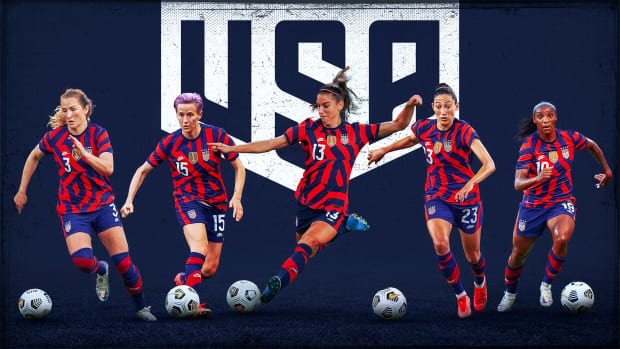
“We know there are some very talented players that won’t be in Japan, but these were the difficult decisions that we had to make,” Andonovski said in a statement. “We have a very experienced roster that has been through adversity at the highest levels, so it’s no surprise those players have distinguished themselves. They’ve embraced the challenges and have shown tremendous flexibility and determination over the past 15 months to get us to where we are today.”
The U.S, which is on a 42-game unbeaten streak entering the send-off series vs. Mexico (July 1 and 5 in Connecticut), will play Sweden, New Zealand and Australia in the group stage of the 12-team competition, where the top two finishers in the three groups and the two best third-place finishers move on to the knockout stage. The quartet featuring host Japan also includes Canada, Team Great Britain and Chile, while the other group features 2019 Women's World Cup finalist Netherlands, Brazil, China and Zambia.
It's a field with some distinct top challengers looking to take down the U.S., and the compressed format coupled with the limited roster size means it's a competition with a unique set of challenges. If the U.S. goes the distance, it'll be six games in 17 days in difficult conditions for a team featuring a number of aging stars, some of whom haven't proven to be 90-minute players recently and others—namely Julie Ertz and Tobin Heath—who are coming off long-term injuries. Between the championship experience and versatility of some of those selected, though, Andonovski is assured of his picks.
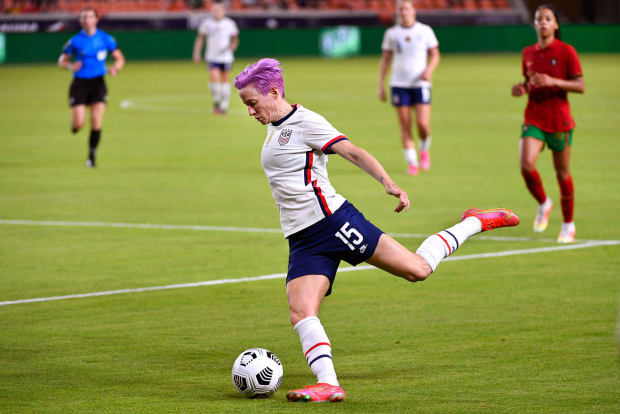
“We’ve got a balanced team with many players who can play several positions, and that will be valuable as we try to play six games in 17 days in heat and humidity,” Andonovski said. “Our coaching staff has confidence that any player on the roster can perform when they get their chance. We have a few players coming back from injuries, but that gave some other players a chance to get some minutes, which was a positive, so now we have to focus on getting our entire roster ready to go and fine-tuning a few things during our send-off series.”
Prior to 2016, the U.S. had never failed to reach the gold medal game, winning four golds and a silver. But the events in Brazil and quarterfinal ouster by Sweden—not to mention the aftermath—have left the U.S. with a feeling of unfinished business, regardless of the Women's World Cup triumph that followed in 2019.
Here are the players tasked with completing the job this time around and securing a fifth gold medal:
GOALKEEPERS
Alyssa Naeher (Chicago Red Stars), Adrianna Franch (Portland Thorns)
Naeher, the starter who answered all questions asked of her at the 2019 Women's World Cup in her first major tournament since succeeding Hope Solo as the U.S. No. 1, will be between the sticks again on the big stage. Barring injury or suspension, it's her show.
Franch, whose penalty-shootout heroics in the NWSL Challenge Cup final helped the Thorns win the preseason tournament, returned to the U.S. setup in the Summer Series and evidently showed enough to edge Houston's Jane Campbell for the backup job. Franch was one of two backups to Naeher at the World Cup along with Ashlyn Harris.
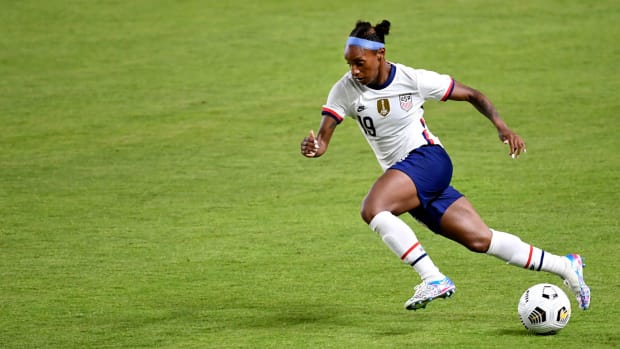
DEFENDERS
Abby Dahlkemper (Manchester City), Tierna Davidson (Chicago Red Stars), Crystal Dunn (Portland Thorns), Kelley O'Hara (Washington Spirit), Becky Sauerbrunn (Portland Thorns), Emily Sonnett (Washington Spirit)
Beyond the core four starters who are carryovers from the last World Cup (O'Hara, Dahlkemper, Sauerbrunn, Dunn), versatility is the name of the game. Davidson, the youngest player on the roster at 22, can feature in the center or out on the left, while Sonnett can operate anywhere across the back. She is one of two players who were alternates in 2016 that make the final cut this time around. Midfielder Sam Mewis is the other.
Midge Purce, whose versatility had been one of the biggest things working in her favor, misses out entirely.
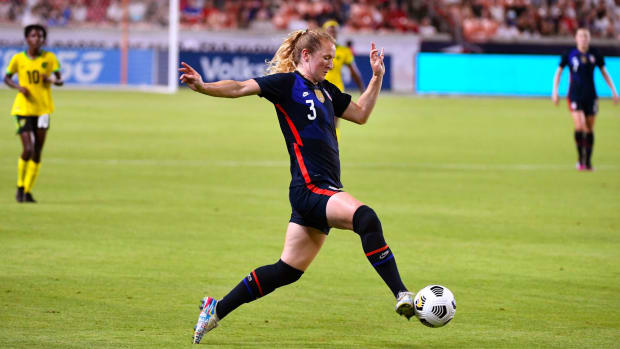
MIDFIELDERS
Julie Ertz (Chicago Red Stars), Lindsey Horan (Portland Thorns), Rose Lavelle (OL Reign), Kristie Mewis (Houston Dash), Sam Mewis (North Carolina Courage)
Ertz makes the trip, but she'll be a chief focus between now and the opener vs. Sweden. Nobody in the U.S. pool can do what she does to the same effect that she does it—that is, smothering an opponent's midfield, linking with the U.S. attack and being an all-around beast on set pieces—but even if she's recovered from her knee sprain in time to feature, she won't have the same match rhythm and fitness as the rest of her teammates. Her No. 6 role fell to Horan in the recent Summer Series in Texas, and that's who will be called upon again if Ertz can't get up to full speed right away.
Just as eyes are on Ertz's health, plenty are on Lavelle's ankle, too, after she rolled it in a Summer Series friendly vs. Jamaica. She's expected to be O.K., but given her injury history, it's just something else to keep in the back of the mind entering tournament play.
Sam Mewis's older sister, Kristie, landed one of the final roster spots and is the only player on the squad who didn't feature at the last World Cup. Her ticket to Tokyo is the culmination of one of the better stories in the U.S. pool, with her going over six years without a cap before rising into contention through her play with the Houston Dash and then proving she had staying power in the U.S. camps which she participated.
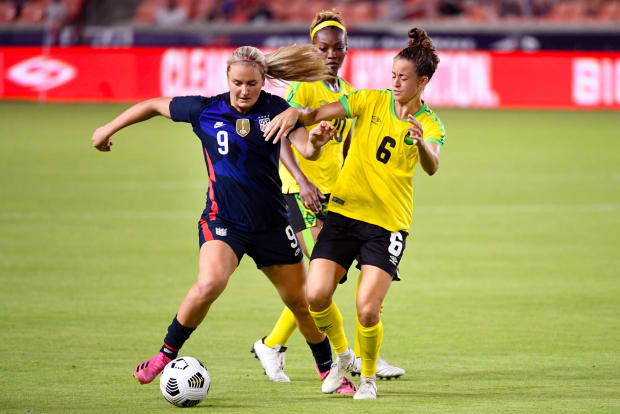
FORWARDS
Tobin Heath (Unattached), Carli Lloyd (NJ/NY Gotham FC), Alex Morgan (Orlando Pride), Christen Press (Unattached), Megan Rapinoe (OL Reign)
As it turns out, the yearlong postponement did little to hamper the aging Lloyd and Rapinoe's chances of making the squad and likely did a great service to Morgan as she worked her way back into playing shape after giving birth to her daughter, Charlie. The veteran trio will head to Japan, but the most in-form U.S. forward at the moment appears to be Press, while her club teammate at Manchester United, Heath, makes the squad despite last playing a competitive game on December 20. Heath suffered an ankle injury that kept her out for an initial 10-to-12-week timetable before suffering a knee injury in her rehab and will have just the two send-off series matches against Mexico next month to get into game shape. It's understandable why she's included given what she's capable of doing, and she was with the U.S. for the Summer Series in a training-only capacity, but it's also a risky proposition that could leave the U.S. a little thin on the wings. Like Lloyd, Heath will also be going to a fourth Olympics.
This group is as accomplished (975 caps, 388 goals, 257 assists between them) as much as it is laced with question marks, and the inability to bring additional forwards without severely hampering the depth in the midfield or defense means that it's on this quintet to produce at the all-world level it's shown it can hit.
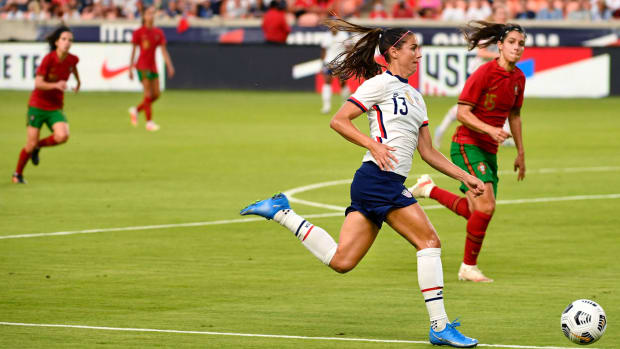
ALTERNATES
Jane Campbell (Houston Dash), Casey Krueger (Chicago Red Stars), Catarina Macario (Lyon), Lynn Williams (North Carolina Courage)
The cases can be made for any of the above, with their exclusions from the full team having more to do with it being a numbers game than anything else. Macario, the 21-year-old, Brazil-born rising star who gained U.S. eligibility in January, evidently did not show enough to convince Andonovski it was worth bumping a veteran for her, but she figures to be a fixture going forward as some of the experienced U.S. players age out. Campbell winds up third in the goalkeeper race, while Williams just happens to be featuring in a time of veteran U.S. forwards who are hard to exclude—fitness questions notwithstanding.
Krueger's selection is mildly surprising given that she was a late replacement addition for the SheBelieves Cup in March, hasn't played in a U.S. camp since and hadn't been in the picture in late 2020 when the U.S. reconvened after the pandemic-induced layoff. She'll provide cover at left back if needed.
The upside to having so many "snubs" is that if the U.S. is pressed to call on its alternates at any point—swaps can be made before or during the Olympics—there at least won't be a significant drop-off in talent.
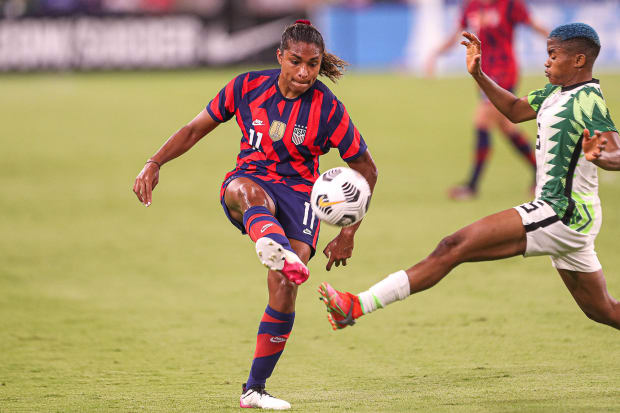
MISSING OUT
Ali Krieger, Ashlyn Harris (Orlando Pride); Midge Purce (NJ/NY Gotham FC); Mal Pugh, Morgan Gautrat (Chicago Red Stars); Andi Sullivan (Washington Spirit); Alana Cook (OL Reign); Sophia Smith (Portland Thorns); Casey Murphy, Jessica McDonald (North Carolina Courage); Emily Fox (Racing Louisville); Jaelin Howell (Florida State)
There are few true surprises among this group, with the 18-player maximum so limiting and Andonovski already trimming down his player pool to a core of roughly 25 players before making his final cuts. Purce, Cook, Smith and Sullivan were likely the closest to the cut line here, while it's still too soon for the 21-year-old Howell, who has a future as Ertz's eventual successor.
For veterans and World Cup winners like Krieger (36 years old), Harris (35) and McDonald (33), this is likely the end of the line for their participation in competitive U.S. matches, while Pugh, who made the full Olympic roster in 2016 as an 18-year-old, still has a place in the U.S. picture if she can stay healthy and get back to the goal-scoring form that gave her the Next Big Thing label once upon a time.
More Women's Soccer Coverage:
- Creditor: USWNT Will Take Trip Down Memory Lane in Olympics Group
- Baccellieri: How Rose Lavelle Found Her Joy
- Geary: Inside the Houston Dash's Transformation
- Smetana: Crystal Dunn Has Mastered the Art of Adaptation
- Brazil's Formiga, 43, to Play in Seventh Olympics
The U.S. women's national team will go for a fifth gold medal with a squad featuring a cast of veterans with championship experience.
One glance at the U.S. women's national team's roster for the upcoming Olympics suggests that manager Vlatko Andonovski ultimately valued one thing above all else: veteran, championship experience.
Of the 18 players picked for the squad, which was revealed on Wednesday, 17 featured on the 2019 Women's World Cup roster and for 11 this will be at least their second Olympic Games. The average age of players on the team, as of the opening match, will be 30.8 years, with one extreme end featuring the oldest Olympian the U.S. has ever had: Carli Lloyd, who will turn 39 five days before that July 21 showdown vs. Sweden and is heading to a USWNT-record-tying fourth Olympics.
Andonovski is banking on that experience paying off in a gauntlet of a tournament, as those 18—along with four alternates, included in the traveling party in the event of injuries—will head to Japan looking to erase the memories of what occurred in Brazil five years ago while also aiming to become the first group to follow a Women's World Cup title immediately with Olympic gold. "Immediately" comes with a bit of a caveat, given the year delay of the Tokyo Games due to the pandemic, but there will be no asterisk that accompanies any medal, especially if it's a historic gold.

“We know there are some very talented players that won’t be in Japan, but these were the difficult decisions that we had to make,” Andonovski said in a statement. “We have a very experienced roster that has been through adversity at the highest levels, so it’s no surprise those players have distinguished themselves. They’ve embraced the challenges and have shown tremendous flexibility and determination over the past 15 months to get us to where we are today.”
The U.S, which is on a 42-game unbeaten streak entering the send-off series vs. Mexico (July 1 and 5 in Connecticut), will play Sweden, New Zealand and Australia in the group stage of the 12-team competition, where the top two finishers in the three groups and the two best third-place finishers move on to the knockout stage. The quartet featuring host Japan also includes Canada, Team Great Britain and Chile, while the other group features 2019 Women's World Cup finalist Netherlands, Brazil, China and Zambia.
It's a field with some distinct top challengers looking to take down the U.S., and the compressed format coupled with the limited roster size means it's a competition with a unique set of challenges. If the U.S. goes the distance, it'll be six games in 17 days in difficult conditions for a team featuring a number of aging stars, some of whom haven't proven to be 90-minute players recently and others—namely Julie Ertz and Tobin Heath—who are coming off long-term injuries. Between the championship experience and versatility of some of those selected, though, Andonovski is assured of his picks.

“We’ve got a balanced team with many players who can play several positions, and that will be valuable as we try to play six games in 17 days in heat and humidity,” Andonovski said. “Our coaching staff has confidence that any player on the roster can perform when they get their chance. We have a few players coming back from injuries, but that gave some other players a chance to get some minutes, which was a positive, so now we have to focus on getting our entire roster ready to go and fine-tuning a few things during our send-off series.”
Prior to 2016, the U.S. had never failed to reach the gold medal game, winning four golds and a silver. But the events in Brazil and quarterfinal ouster by Sweden—not to mention the aftermath—have left the U.S. with a feeling of unfinished business, regardless of the Women's World Cup triumph that followed in 2019.
Here are the players tasked with completing the job this time around and securing a fifth gold medal:
GOALKEEPERS
Alyssa Naeher (Chicago Red Stars), Adrianna Franch (Portland Thorns)
Naeher, the starter who answered all questions asked of her at the 2019 Women's World Cup in her first major tournament since succeeding Hope Solo as the U.S. No. 1, will be between the sticks again on the big stage. Barring injury or suspension, it's her show.
Franch, whose penalty-shootout heroics in the NWSL Challenge Cup final helped the Thorns win the preseason tournament, returned to the U.S. setup in the Summer Series and evidently showed enough to edge Houston's Jane Campbell for the backup job. Franch was one of two backups to Naeher at the World Cup along with Ashlyn Harris.

DEFENDERS
Abby Dahlkemper (Manchester City), Tierna Davidson (Chicago Red Stars), Crystal Dunn (Portland Thorns), Kelley O'Hara (Washington Spirit), Becky Sauerbrunn (Portland Thorns), Emily Sonnett (Washington Spirit)
Beyond the core four starters who are carryovers from the last World Cup (O'Hara, Dahlkemper, Sauerbrunn, Dunn), versatility is the name of the game. Davidson, the youngest player on the roster at 22, can feature in the center or out on the left, while Sonnett can operate anywhere across the back. She is one of two players who were alternates in 2016 that make the final cut this time around. Midfielder Sam Mewis is the other.
Midge Purce, whose versatility had been one of the biggest things working in her favor, misses out entirely.

MIDFIELDERS
Julie Ertz (Chicago Red Stars), Lindsey Horan (Portland Thorns), Rose Lavelle (OL Reign), Kristie Mewis (Houston Dash), Sam Mewis (North Carolina Courage)
Ertz makes the trip, but she'll be a chief focus between now and the opener vs. Sweden. Nobody in the U.S. pool can do what she does to the same effect that she does it—that is, smothering an opponent's midfield, linking with the U.S. attack and being an all-around beast on set pieces—but even if she's recovered from her knee sprain in time to feature, she won't have the same match rhythm and fitness as the rest of her teammates. Her No. 6 role fell to Horan in the recent Summer Series in Texas, and that's who will be called upon again if Ertz can't get up to full speed right away.
Just as eyes are on Ertz's health, plenty are on Lavelle's ankle, too, after she rolled it in a Summer Series friendly vs. Jamaica. She's expected to be O.K., but given her injury history, it's just something else to keep in the back of the mind entering tournament play.
Sam Mewis's older sister, Kristie, landed one of the final roster spots and is the only player on the squad who didn't feature at the last World Cup. Her ticket to Tokyo is the culmination of one of the better stories in the U.S. pool, with her going over six years without a cap before rising into contention through her play with the Houston Dash and then proving she had staying power in the U.S. camps which she participated.

FORWARDS
Tobin Heath (Unattached), Carli Lloyd (NJ/NY Gotham FC), Alex Morgan (Orlando Pride), Christen Press (Unattached), Megan Rapinoe (OL Reign)
As it turns out, the yearlong postponement did little to hamper the aging Lloyd and Rapinoe's chances of making the squad and likely did a great service to Morgan as she worked her way back into playing shape after giving birth to her daughter, Charlie. The veteran trio will head to Japan, but the most in-form U.S. forward at the moment appears to be Press, while her club teammate at Manchester United, Heath, makes the squad despite last playing a competitive game on December 20. Heath suffered an ankle injury that kept her out for an initial 10-to-12-week timetable before suffering a knee injury in her rehab and will have just the two send-off series matches against Mexico next month to get into game shape. It's understandable why she's included given what she's capable of doing, and she was with the U.S. for the Summer Series in a training-only capacity, but it's also a risky proposition that could leave the U.S. a little thin on the wings. Like Lloyd, Heath will also be going to a fourth Olympics.
This group is as accomplished (975 caps, 388 goals, 257 assists between them) as much as it is laced with question marks, and the inability to bring additional forwards without severely hampering the depth in the midfield or defense means that it's on this quintet to produce at the all-world level it's shown it can hit.

ALTERNATES
Jane Campbell (Houston Dash), Casey Krueger (Chicago Red Stars), Catarina Macario (Lyon), Lynn Williams (North Carolina Courage)
The cases can be made for any of the above, with their exclusions from the full team having more to do with it being a numbers game than anything else. Macario, the 21-year-old, Brazil-born rising star who gained U.S. eligibility in January, evidently did not show enough to convince Andonovski it was worth bumping a veteran for her, but she figures to be a fixture going forward as some of the experienced U.S. players age out. Campbell winds up third in the goalkeeper race, while Williams just happens to be featuring in a time of veteran U.S. forwards who are hard to exclude—fitness questions notwithstanding.
Krueger's selection is mildly surprising given that she was a late replacement addition for the SheBelieves Cup in March, hasn't played in a U.S. camp since and hadn't been in the picture in late 2020 when the U.S. reconvened after the pandemic-induced layoff. She'll provide cover at left back if needed.
The upside to having so many "snubs" is that if the U.S. is pressed to call on its alternates at any point—swaps can be made before or during the Olympics—there at least won't be a significant drop-off in talent.

MISSING OUT
Ali Krieger, Ashlyn Harris (Orlando Pride); Midge Purce (NJ/NY Gotham FC); Mal Pugh, Morgan Gautrat (Chicago Red Stars); Andi Sullivan (Washington Spirit); Alana Cook (OL Reign); Sophia Smith (Portland Thorns); Casey Murphy, Jessica McDonald (North Carolina Courage); Emily Fox (Racing Louisville); Jaelin Howell (Florida State)
There are few true surprises among this group, with the 18-player maximum so limiting and Andonovski already trimming down his player pool to a core of roughly 25 players before making his final cuts. Purce, Cook, Smith and Sullivan were likely the closest to the cut line here, while it's still too soon for the 21-year-old Howell, who has a future as Ertz's eventual successor.
For veterans and World Cup winners like Krieger (36 years old), Harris (35) and McDonald (33), this is likely the end of the line for their participation in competitive U.S. matches, while Pugh, who made the full Olympic roster in 2016 as an 18-year-old, still has a place in the U.S. picture if she can stay healthy and get back to the goal-scoring form that gave her the Next Big Thing label once upon a time.
More Women's Soccer Coverage:


0 Comments